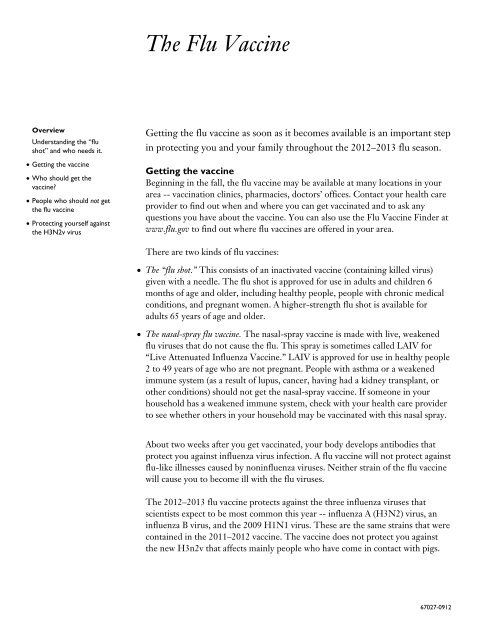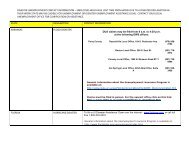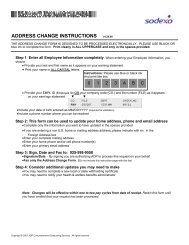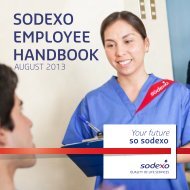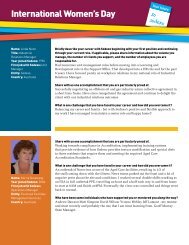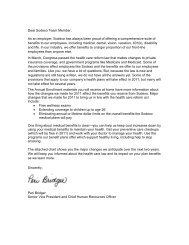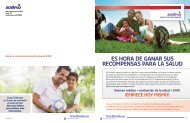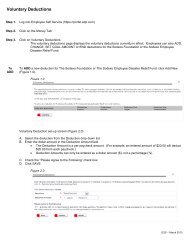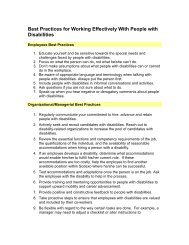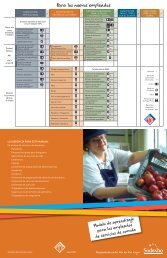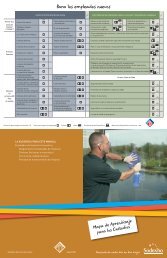Learn About the Flu Vaccine - I am Sodexo
Learn About the Flu Vaccine - I am Sodexo
Learn About the Flu Vaccine - I am Sodexo
Create successful ePaper yourself
Turn your PDF publications into a flip-book with our unique Google optimized e-Paper software.
The <strong>Flu</strong> <strong>Vaccine</strong>OverviewUnderstanding <strong>the</strong> “flushot” and who needs it.• Getting <strong>the</strong> vaccine• Who should get <strong>the</strong>vaccine?• People who should not get<strong>the</strong> flu vaccine• Protecting yourself against<strong>the</strong> H3N2v virusGetting <strong>the</strong> flu vaccine as soon as it becomes available is an important stepin protecting you and your f<strong>am</strong>ily throughout <strong>the</strong> 2012–2013 flu season.Getting <strong>the</strong> vaccineBeginning in <strong>the</strong> fall, <strong>the</strong> flu vaccine may be available at many locations in yourarea -- vaccination clinics, pharmacies, doctors’ offices. Contact your health careprovider to find out when and where you can get vaccinated and to ask anyquestions you have about <strong>the</strong> vaccine. You can also use <strong>the</strong> <strong>Flu</strong> <strong>Vaccine</strong> Finder atwww.flu.gov to find out where flu vaccines are offered in your area.There are two kinds of flu vaccines:• The “flu shot.” This consists of an inactivated vaccine (containing killed virus)given with a needle. The flu shot is approved for use in adults and children 6months of age and older, including healthy people, people with chronic medicalconditions, and pregnant women. A higher-strength flu shot is available foradults 65 years of age and older.• The nasal-spray flu vaccine. The nasal-spray vaccine is made with live, weakenedflu viruses that do not cause <strong>the</strong> flu. This spray is sometimes called LAIV for“Live Attenuated Influenza <strong>Vaccine</strong>.” LAIV is approved for use in healthy people2 to 49 years of age who are not pregnant. People with asthma or a weakenedimmune system (as a result of lupus, cancer, having had a kidney transplant, oro<strong>the</strong>r conditions) should not get <strong>the</strong> nasal-spray vaccine. If someone in yourhousehold has a weakened immune system, check with your health care providerto see whe<strong>the</strong>r o<strong>the</strong>rs in your household may be vaccinated with this nasal spray.<strong>About</strong> two weeks after you get vaccinated, your body develops antibodies thatprotect you against influenza virus infection. A flu vaccine will not protect againstflu-like illnesses caused by noninfluenza viruses. Nei<strong>the</strong>r strain of <strong>the</strong> flu vaccinewill cause you to become ill with <strong>the</strong> flu viruses.The 2012–2013 flu vaccine protects against <strong>the</strong> three influenza viruses thatscientists expect to be most common this year -- influenza A (H3N2) virus, aninfluenza B virus, and <strong>the</strong> 2009 H1N1 virus. These are <strong>the</strong> s<strong>am</strong>e strains that werecontained in <strong>the</strong> 2011–2012 vaccine. The vaccine does not protect you against<strong>the</strong> new H3n2v that affects mainly people who have come in contact with pigs.67027-0912
2 • The <strong>Flu</strong> <strong>Vaccine</strong>Who should get <strong>the</strong> vaccine?The Centers for Disease Control and Prevention (www.cdc.gov) recommendsthat, with certain exceptions, everyone over <strong>the</strong> age of 6 months get <strong>the</strong> fluvaccine.Because <strong>the</strong>y have a higher risk of developing flu-related problems, or live withor care for people who have a higher risk, it is especially important that people in<strong>the</strong> following groups get vaccinated:• pregnant women• children younger than 5 years old, and especially those younger than 2 years old(If this is <strong>the</strong>ir first year to receive <strong>the</strong> vaccine, children 8 years of age and undermay need two doses.)• people who are 65 years old or older• people who have certain medical conditions, including asthma, neurological andneurodevelopmental conditions, chronic lung disease, heart disease, blooddisorders, kidney disorders, endocrine disorders, liver disorders, metabolicdisorders, a weakened immune system (due to medication or disease), chronicobstructive pulmonary disease (COPD), people who are morbidly obese (have abody mass index of over 30), and those under 19 who are receiving long-termaspirin <strong>the</strong>rapyThe CDC says that, in addition, “American Indians and Alaskan Natives seem tobe at higher risk of flu-related complications.”O<strong>the</strong>r people for whom getting <strong>the</strong> vaccine is especially important include:• people who live in nursing homes or long-term care facilities• people who live with or care for those at high risk for flu-related complications,including health care workers and household contacts of people at high risk forcomplications from flu, such as caregivers of children under <strong>the</strong> age of 5 andespecially under <strong>the</strong> age of 6 monthsPeople who should not get <strong>the</strong> flu vaccineThe following should not get vaccinated without first consulting <strong>the</strong>ir health careprovider:• people who have a severe allergy to chicken eggs, one that includes respiratorysymptoms or breathing trouble• people who have had a severe reaction to an influenza vaccination• people who developed Guillain-Barré syndrome (GBS) within 6 weeks of gettingan influenza vaccine
3 • The <strong>Flu</strong> <strong>Vaccine</strong>• children under 6 months of age• people who have a moderate-to-severe illness with a fever (who should wait toget vaccinated until after <strong>the</strong>ir symptoms lessen)Contact your health care provider if you have questions or concerns aboutgetting <strong>the</strong> flu vaccine. You can find additional flu and vaccine information at<strong>Flu</strong>.gov (www.flu.gov).Protecting yourself against <strong>the</strong> H3N2v virusNo vaccine has been developed to protect against H3N2v, a new flu virus thathas affected more than 200 people since July 2012. H3N2v is a variant of <strong>the</strong>H3N2 virus. It has symptoms similar to those of <strong>the</strong> seasonal flu but is verydifferent from it. The new H3N2v virus usually spreads from infected pigs tohumans. Most people who have developed it have had direct or close contact withpigs -- for ex<strong>am</strong>ple, on farms or at county agricultural fairs.But H3N2v can also spread from one person to ano<strong>the</strong>r through coughing orsneezing. To reduce your risk, take all <strong>the</strong> steps recommended to protect yourselffrom <strong>the</strong> seasonal flu. “In addition, avoid close contact with animals, especiallywith pigs, that look or act sick,” <strong>the</strong> U.S. Department of Health and HumanServices says. “If you must come in contact with sick animals, you should takeappropriate precautions such as wearing gloves.”Contact your health care provider if you develop flu symptoms and live in an areawhere H3N2v has occurred recently. Explain that you have had contact with pigsor with sick people. You doctor can help you decide whe<strong>the</strong>r testing andtreatment are needed. Visit www.flu.gov and search for “H3N2v” to learn more.Adapted from materials published by <strong>the</strong> U.S. Department of Health and Human Services and <strong>the</strong>Centers for Disease Control and Prevention. Written with <strong>the</strong> help of Deborah Borchers, MD.© 2009, 2012 Ceridian Corporation. All rights reserved. 092712


